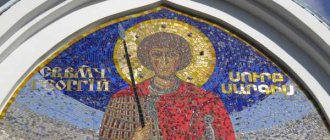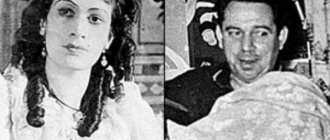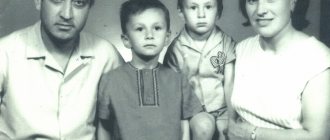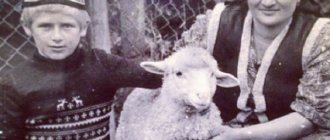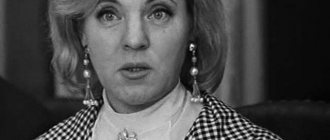Anatoly Borisovich Chubais - Soviet and Russian statesman, economist and top manager. General Director of the state corporation "Russian Nanotechnology Corporation" and Chairman of the Board of JSC Rusnano.
In this article we will look at the main events in the biography of Anatoly Chubais and the most interesting facts from his personal and political life.
So, here is a short biography of Chubais.
Biography of Anatoly Chubais
Anatoly Chubais was born on June 16, 1955 in the Belarusian city of Borisov. He grew up and was brought up in the family of a military man.
Chubais's father, Boris Matveevich, was a retired officer. During the Great Patriotic War (1941-1945) he served in tank forces. After the end of the war, Chubais Sr. taught Marxism-Leninism at a Leningrad university.
The mother of the future politician, Raisa Khamovna, was Jewish and educated as an economist. In addition to Anatoly, another boy was born in the Chubais family, Igor, who today is a sociologist and Doctor of Philosophy.
Childhood and youth
From an early age, Anatoly Chubais was often present during heated arguments between his father and older brother, which concerned political and philosophical topics.
Anatoly Chubais in childhood
He carefully watched their conversations, listening with interest to first one point of view and then the other.
Anatoly went to first grade in Odessa. However, due to their father’s service, the family periodically had to live in different cities, so the children managed to change more than one educational institution.
In the 5th grade, he studied at a Leningrad school with a strong military-patriotic bias, which greatly irritated the future politician.
After receiving a certificate of secondary education, Chubais successfully passed the exams at the Leningrad Engineering and Economics Institute at the Faculty of Mechanical Engineering. He had high grades in all disciplines, as a result of which he managed to graduate from the university with honors.
In 1978, Anatoly joined the ranks of the CPSU. After 5 years, he defended his dissertation and became a candidate of economic sciences. After this, the guy got a job at his native institute as an engineer and associate professor.
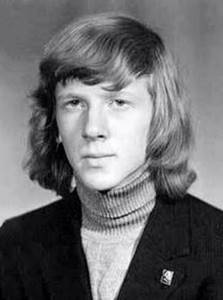
Anatoly Chubais in his youth
At this time, Anatoly Chubais met the future Russian Finance Minister Yegor Gaidar. This meeting seriously influenced his political biography.
On Yeltsin's team
It is known that Chubais played an important role in the 1996 Russian presidential elections. He was the immediate leader of Yeltsin's election campaign. For this purpose, the Civil Society Foundation was created. An analytical group began working on its basis. The result of their activities was truly outstanding.
On the eve of the elections, Yeltsin's rating was minimal, but as a result of the use of successful political technologies, it grew steadily. As a result, in the first round, the future president, unexpectedly for many, managed to beat the communist Gennady Zyuganov, who was considered the leader of the race. Yeltsin received 35.3% of the votes against 32% for the head of the Communist Party of the Russian Federation. In the second round, the decisive factor was the support that Boris Nikolayevich received from Alexander Lebed, who took third place with 14.5%. As a result, Yeltsin won, receiving 53.8% of the vote. Almost forty and a half million voters voted for him.
That election campaign was marred by a number of political scandals. It was then that the now famous “copier box” incident occurred. On the night of June 20, the producer of Yeltsin’s headquarters, Sergei Lisovsky, who was responsible for PR, as well as campaign headquarters activist Arkady Evstafiev were detained in the White House. According to the widespread version, which has never been officially confirmed, a Xerox box containing 500 thousand dollars was seized from them.
It is known that the initiators of the detention were the head of Yeltsin’s security service, Mikhail Korzhakov, First Deputy Prime Minister Oleg Soskovets, and the head of the FSB, Mikhail Barsukov. This was an attempt by conservatives from Yeltsin’s circle to seize the initiative from the hands of the “young reformers,” which included Chubais. The plan failed, and the next morning Korzhakov, Barsukov and Soskovets lost their posts.
Chubais himself later stated that Lisovsky and Evstafiev did not have money; Korzhakov’s people allegedly planted it.
However, in April of the following year, a criminal case was opened due to illegal transactions with currency on a particularly large scale. It was soon closed because investigators were unable to find the owners of the box.
Yeltsin’s daughter Tatyana Dyachenko, who was also a member of the headquarters, repeatedly spoke about Chubais’s role in the election campaign. According to her, when at the beginning of 1996 it became obvious to those around him that the headquarters led by Soskovets was failing, it was Chubais who convinced the president to create a new structure, which was called the analytical group. It was she who played a decisive role in Yeltsin’s victory.
Policy
At the end of the 80s, Anatoly Borisovich formed the Perestroika club, in which various economists participated. Later, many of the club members received high positions in the government of the Russian Federation.
Over time, the chairman of the Leningrad City Council, Anatoly Sobchak, drew attention to Chubais, who made him his deputy. After the collapse of the USSR, Chubais became the chief economic development adviser at the Leningrad mayor's office.
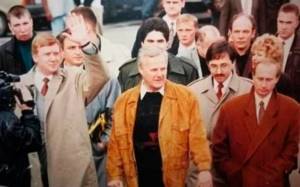
Anatoly Chubais, Anatoly Sobchak and Vladimir Putin
An interesting fact is that around the same time, Vladimir Putin became the mayor’s adviser, but on foreign economic relations.
In 1992, another significant event occurred in the biography of Anatoly Chubais. For his professional qualities, he was entrusted with taking the post of Deputy Prime Minister of Russia under President Boris Yeltsin.
Once in his new position, Chubais is developing a large-scale privatization program, as a result of which hundreds of thousands of state-owned enterprises are passing into the hands of private owners. This program still causes heated debate and a lot of extremely negative responses in society today.
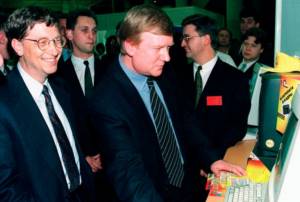
Anatoly Chubais and Bill Gates
In 1993, Anatoly Chubais became a State Duma deputy from the Russia's Choice party. After that, he received the post of First Deputy Prime Minister of the Russian Federation, and also headed the Federal Commission on the Stock Market and Securities.
In 1996, Chubais supported the political course of Boris Yeltsin, providing him with significant support in the race for the presidency. For the assistance provided, Yeltsin will make him head of the presidential administration in the future.
Two years later, the politician became the head of the board of RAO UES of Russia. Soon he carried out a serious reform, as a result of which all structures of the holding were restructured.
The result of this reform was the transfer of the overwhelming majority of shares to private investors. A number of shareholders harshly criticized Chubais, calling him the worst manager in the Russian Federation.
In 2008, the energy sector was liquidated, and Anatoly Chubais became the general director of the Russian Nanotechnology Corporation. After 3 years, this corporation was reorganized, receiving the status of a leading innovative company in the Russian Federation.
Assassination
In 2005, an attempt was made on the politician's life. As his car was traveling to the Moscow region, a bomb was detonated, and the cars of the motorcade in which the hero of our article was traveling were fired upon. Chubais was not injured. Three people became suspects in the case: retired GRU colonel Vladimir Kvachkov, paratroopers Robert Yashin and Alexander Naydenov.
Kvachkov began to engage in politics in prison, declaring that the assassination attempt on Chubais was one of the forms of the national liberation war. At the same time, he repeatedly stated that his involvement in the assassination attempt had not been proven.
The criminal case was considered by a jury, which acquitted all three suspects. However, the Supreme Court later overturned this decision, remanding the case for a new trial. A new suspect has also emerged - lawyer and writer Ivan Mironov. In August 2010, the jury again acquitted the suspects, and almost half of the jurors rendered a verdict according to which the attempt on Chubais’s life in 2005 was just an imitation.
Personal life
Over the years of his biography, Anatoly Chubais married three times. He met his first wife, Lyudmila Grigorieva, during his student years. The couple had a son, Alexey, and a daughter, Olga.
The politician’s second wife was Maria Vishnevskaya, who also had an economic education. The couple had been married for 21 years, but there was no addition to the family.
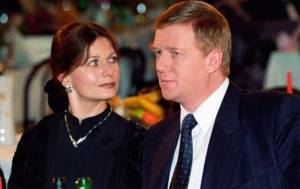
Anatoly Chubais and Maria Vishnevskaya
For the third time, Chubais married Avdotya Smirnova. They got married in 2012 and still live together. Avdotya is a journalist, director and TV presenter of the “School of Scandal” program.
In his free time, Anatoly Chubais likes to travel to different cities and countries. He enjoys skiing and water sports. He likes the work of The Beatles, Andrei Makarevich and Vladimir Vysotsky.
According to the income statement for 2014, Anatoly Borisovich’s capital amounted to 207 million rubles. The Chubais family has 2 apartments in Moscow, as well as one apartment each in St. Petersburg and Portugal.
In addition, the couple owns two BMW X5 and BMW 530 XI cars and a Yamaha SXV70VT snowmobile. On the Internet you can see many videos and photographs in which the politician rides his snowmobile across the Russian expanses.
In 2011, Anatoly Chubais headed the board of directors of Rusnano LLC. According to the authoritative publication Forbes, in this position, transactions with valuable shares brought the politician more than 1 billion rubles in 2015 alone.
Income
According to the latest income declarations, Chubais earns more than 200 million rubles a year, his wife is several times less.
At the same time, they own two apartments in Moscow, one in St. Petersburg, and an apartment in Portugal with an area of 133 square meters. The family's fleet consists of two BMW cars and a Yamaha snowmobile.
Where is Anatoly Chubais now? Public Joint Stock Company "Rusnano" is the organization in which the hero of our article works. Currently Anatoly Chubais holds the post of Chairman of the Board.
Anatoly Chubais today
Anatoly Chubais has accounts on Facebook and Twitter, where he comments on certain events in the country and the world. In 2021, he joined the supervisory board of the Moscow Innovation Cluster Foundation.
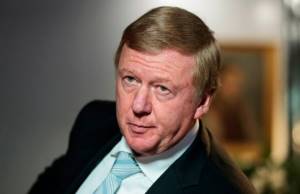
Anatoly Chubais today
As of today, Chubais is one of the most unpopular officials in Russia. According to sociological surveys, over 70% of his compatriots do not trust him.
Anatoly Borisovich rarely communicates with his brother Igor. In an interview, Igor Chubais admitted that while they lived a simple life, there were no problems between them. However, when Tolik became an influential official, their paths diverged.
It is worth noting that the elder brother of Anatoly Chubais is a believer. For this and other reasons, he does not share his younger brother's views on life.
In the CPSU
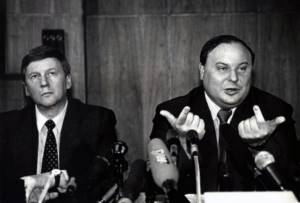
During the same period, Chubais became a member of the Communist Party of the Soviet Union. He gains a large number of like-minded people who form an informal democratic circle around the hero of our article. Leningraders become its members, for whom Anatoly Borisovich himself begins to organize seminars on economics.
The ultimate goal of all these meetings is to promote democratic ideas among the broadest masses of the intelligentsia. It was at one of these seminars that the hero of our article met his future colleague in leading the country, Yegor Gaidar.
Chubais's great friend fled to London along with his pensions. Now he is a “victim of the regime”
Interpol refused to issue Russia an international warrant for the arrest and extradition from Great Britain of those involved in the criminal case of embezzlement of 30 billion rubles of oligarch Boris Mints and his sons. Why did the West suddenly decide to protect a swindler? The answer to this question was given by Constantinople observer Yuri Pronko.
Many questions have long arisen regarding the current regulation policy of the Central Bank, including regarding the work of non-state pension funds, says Yuriy Pronko. As is known, in addition to the banking sector itself, the Central Bank of Russia supervises and regulates and controls the insurance market, as well as the market of non-state pension funds.
And here there really are many significant questions that I would like to ask not only the regulator, but also the law enforcement and enforcement authorities of our country. We are talking about the “scam of the century” - the embezzlement case at Otkritie Bank, in which businessman, owner of O1 Group Boris Mints and his sons, Alexander and Dmitry, were involved.
Interpol, unfortunately, refused to issue Russia an international arrest warrant for the oligarch who fled from Russia to the UK in 2018.
Yuri Pronko: “I believe that Otkritie Bank is the scam of the century, which will definitely be included in all financial literacy textbooks of financial, economic and law faculties.” Screenshot: Constantinople.
After almost six months of consideration, the international police came to the conclusion that there were no grounds for searching for members of the Mints family, so they were all excluded from the list of wanted persons, a representative of the businessman said.
The reason for the refusal was “the lack of substantiated arguments in the case against the Mintz family.” And another quote: “Evidence presented by the Mintz family also indicated that there were irregularities in the trial and that the trial was politically motivated.
In Russia, Boris Mints and his sons are facing a criminal case for embezzlement (Article 160 of the Criminal Code) of funds from Otkritie Bank. All three were arrested in absentia: Mints fled Russia in May 2021. By the time his father arrived, one of his sons had already bought a luxury spa hotel in the most prestigious area of London.
Honestly, I believe that Otkritie Bank is the scam of the century, which will definitely be included in all financial literacy textbooks of financial, economic and law faculties. Because what Mintz has created is unprecedented. And this is a scammer. What amused me most personally was the wording about a “politically motivated trial.”
Another “victim of the bloody regime,” he had fun here like no one else, surrounded by people like Anatoly Chubais , who now holds the post of special representative of the Russian President for relations with international organizations.
Boris Mints successfully used “cross investments”, which he used in his time in the so-called Moscow ring, recalled Yuri Pronko. It happened like this: non-state pension funds sent up to 15 percent of their pension funds to each of the four ring banks.
The banks, in turn, transferred these funds to the family office of the oligarch Boris Mints, and she was already buying real estate. Another 15 percent of non-state pension funds were allocated for the purchase of the same real estate directly. As a result, this “victim of the bloody regime” withdrew up to 75 percent of the pension funds from the fund, but the law was not violated - that’s the most important thing.
Then, as we already know, Mintz fled to London. How he escaped is a big question. All of his 7 pension funds and 4 banks collapsed. The Investigative Committee opened a case of fraud, but the defendant had already left for the British capital. The 33 billion rubles due to investors were compensated at the expense of the state. At our expense.
And now it is reported that the trial against this “victim of the bloody regime,” a great friend of Anatoly Chubais, is “politically motivated.”
Where was it “politically motivated”? So Zhenya Dankevich , Mints’s right hand, left foot, having fled to Israel, immediately dashed off a message that he, too, was being persecuted for “political reasons,” they say, “the bloody KGB is pursuing him.” Guys, look what you've done. You grabbed your pension money - up to 75 percent of the total amount.
By the way, I have a question not only for these characters, Pronko continued. But also to regulators and law enforcement. How did he manage to wave his wings at all of us, this Maltese citizen Boris Mintz?
I just don’t know, this position of our elite, how far can it go? If you get out, get out. But you are swindlers and thieves. You think that Russia is a country that you can wipe your feet on. It is impossible to be in such a state all the time, so you are ticking there, to the West. You have built such “stability”, from which you yourself are brought down. The main thing is to then write “politically motivated trial, I am being persecuted by the regime.” So he’s persecuting you like swindlers!
And, of course, there is a question for the Central Bank, Yuri Pronko is sure. When Mints and his accomplices created their pyramid scheme based on one of the OFZ issues, this was also well known in narrow circles on the market. What has the regulator done? Nothing!
And there were many such different schemes - who bought from whom, who bought from whom. Now one person involved is in London, another is in Israel, the third is somewhere in America. But in the end, tens of billions of rubles had to be compensated at the expense of taxpayers.
At RAO UES of Russia
In 1997, Chubais returned to the government as First Deputy Prime Minister, at the same time becoming Minister of Finance of the Russian Federation. But he did not remain in this position for long. Already in the spring of 1998, he left the service, resigning with the entire cabinet of the head of government.
Anatoly Borisovich was not without work for a long time. In the same year, he won the election as head of the board of the Russian joint-stock company Unified Energy System of Russia. In this position, he carried out a new large-scale reform. As part of it, he began to restructure all structures that make up the holding, transferring the lion's share of their shares into private hands. And many politicians actively criticized this reform. In conservative circles, Chubais began to be called the worst manager in Russia. However, the situation soon changed.
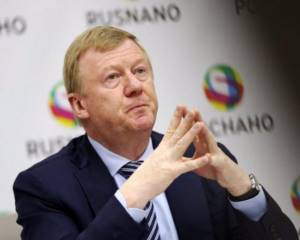
In 2008, the energy company was finally liquidated. Chubais was appointed general director of the state-owned Russian Nanotechnology Corporation. Three years later, under his leadership, it was reorganized into the open joint-stock company RUSNANO, where Anatoly Borisovich Chubais currently works. The company is considered a leading innovative enterprise in Russia.
Modern experts positively assess Chubais’s work at RUSNANO. In particular, over the past decade, the company has built 96 factories in 37 regions of the Russian Federation. Now many are saying that Chubais has forced himself to be talked about as an effective manager.
Anatoly Borisovich himself considers the solar energy development project one of the most important and successful in his career. In Chuvashia, RUSNANO was built, which switched from imported technology with an efficiency factor of 9% to domestic technology, the efficiency of which was 22%. Thus, the enterprise today finds itself among the top three leaders in the world in terms of efficiency.
Another successful project was the development of nuclear medicine. created eleven tomography centers for the diagnosis of cardiac, oncological and neurological diseases, as well as for the treatment of oncology using radiosurgery.

